- Home
- W. Somerset Maugham
The Summing Up Page 4
The Summing Up Read online
Page 4
For to write good prose is an affair of good manners. It is, unlike verse, a civil art. Poetry is baroque. Baroque is tragic, massive and mystical. It is elemental. It demands depth and insight. I cannot but feel that the prose writers of the baroque period, the authors of King James’s Bible, Sir Thomas Browne, Glanville, were poets who had lost their way. Prose is a rococo art. It needs taste rather than power, decorum rather than inspiration and vigour rather than grandeur. Form for the poet is the bit and the bridle without which (unless you are an acrobat) you cannot ride your horse; but for the writer of prose it is the chassis without which your car does not exist. It is not an accident that the best piose was written when rococo, with its elegance and moderation, at its birth attained its greatest excellence. For rococo was evolved when baroque had become declamatory and the world, tired of the stupendous, asked for restraint. It was the natural expression of persons who valued a civilized life. Humour, tolerance and horse-sense made the great tragic issues that had preoccupied the first half of the seventeenth century seem excessive. The world was a more comfortable place to live in, and perhaps for the first time in centuries the cultivated classes could sit back and enjoy their leisure. It has been said that good prose should resemble the conversation of a well-bred man. Conversation is only possible when men’s minds are free from pressing anxieties. Their lives must be reasonably secure and they must have no grave concern about their souls. They must attach importance to the refinements of civilisation. They must value courtesy, they must pay attention to their persons (and have we not also been told that good prose should be like the clothes of a well-dressed man, appropriate but unobtrusive?), they must fear to bore, they must be neither flippant nor solemn, but always apt; and they must look upon ‘enthusiasm’ with a critical glance. This is a soil very suitable for prose. It is not to be wondered at that it gave a fitting opportunity for the appearance of the best writer of prose that our modern world has seen, Voltaire. The writers of English, perhaps owing to the poetic nature of the language, have seldom reached the excellence that seems to have come so naturally to him. It is in so far as they have approached the ease, sobriety and precision of the great French masters that they are admirable.
13
WHETHER you ascribe importance to euphony, the last of the three characteristics that I mentioned, must depend on the sensitiveness of your ear. A great many readers, and many admirable writers, are devoid of this quality. Poets as we know have always made a great use of alliteration. They are persuaded that the repetition of a sound gives an effect of beauty. I do not think it does so in prose. It seems to me that in prose alliteration should be used only for a special reason; when used by accident it falls on the ear very disagreeably. But its accidental use is so common that one can only suppose that the sound of it is not universally offensive. Many writers without distress will put two rhyming words together, join a monstrous long adjective to a monstrous long noun, or between the end of one word and the beginning of another have a conjunction of consonants that almost breaks your jaw. These are trivial and obvious instances. I mention them only to prove that if careful writers can do such things it is only because they have no ear. Words have weight, sound and appearance; it is only by considering these that you can write a sentence that is good to look at and good to listen to.
I have read many books on English prose, but have found it hard to profit by them; for the most part they are vague, unduly theoretical, and often scolding. But you cannot say this of Fowler’s Dictionary of English Usage. It is a valuable work. I do not think anyone writes so well that he cannot learn much from it. It is lively reading. Fowler liked simplicity, straightforwardness and common sense. He had no patience with pretentiousness. He had a sound feeling that idiom was the backbone of a language and he was all for the racy phrase. He was no slavish admirer of logic and was willing enough to give usage right of way through the exact demesnes of grammar. English grammar is very difficult and few writers have avoided making mistakes in it. So heedful a writer as Henry James, for instance, on occasion wrote so ungrammatically that a schoolmaster, finding such errors in a schoolboy’s essay, would be justly indignant. It is necessary to know grammar, and it is better to write grammatically than not, but it is well to remember that grammar is common speech formulated. Usage is the only test. I prefer a phrase that is easy and unaffected to a phrase that is grammatical. One of the differences between French and English is that in French you can be grammatical with complete naturalness, but in English not invariably. It is a difficulty in writing English that the sound of the living voice dominates the look of the printed word. I have given the matter of style a great deal of thought and have taken great pains. I have written few pages that I feel I could not improve and far too many that I have left with dissatisfaction because, try as I would, I could do no better. I cannot say of myself what Johnson said of Pope: ‘He never passed a fault unamended by indifference, nor quitted it by despair.’ I do not write as I want to; I write as I can.
But Fowler had no ear. He did not see that simplicity may sometimes make concessions to euphony. I do not think a far-fetched, an archaic or even an affected word is out of place when it sounds better than the blunt, obvious one or when it gives a sentence a better balance. But, I hasten to add, though I think you may without misgiving make this concession to pleasant sound, I think you should make none to what may obscure your meaning. Anything is better than not to write clearly. There is nothing to be said against lucidity, and against simplicity only the possibility of dryness. This is a risk that is well worth taking when you reflect how much better it is to be bald than to wear a curly wig. But there is in euphony a danger that must be considered. It is very likely to be monotonous. When George Moore began to write, his style was poor; it gave you the impression that he wrote on wrapping paper with a blunt pencil. But he developed gradually a very musical English. He learnt to write sentences that fall away on the ear with a misty langour, and it delighted him so much that he could never have enough of it. He did not escape monotony. It is like the sound of water lapping a shingly beach, so soothing that you presently cease to be sensible of it. It is so mellifluous that you hanker for some harshness, for an abrupt dissonance, that will interrupt the silky concord. I do not know how one can guard against this. I suppose the best chance is to have a more lively faculty of boredom than one’s readers so that one is wearied before they are. One must always be on the watch for mannerisms, and when certain cadences come too easily to the pen ask oneself whether they have not become mechanical. It is very hard to discover the exact point where the idiom one has formed to express oneself has lost its tang. As Dr. Johnson said: ‘He that has once studiously formed a style, rarely writes afterwards with complete ease.’ Admirably as I think Matthew Arnold’s style was suited to his particular purposes, I must admit that his mannerisms are often irritating. His style was an instrument that he had forged once for all; it was not like the human hand capable of performing a variety of actions.
If you could write lucidly, simply, euphoniously and yet with liveliness you would write perfectly: you would write like Voltaire. And yet we know how fatal the pursuit of liveliness may be: it may result in the tiresome acrobatics of Meredith. Macaulay and Carlyle were in their different ways arresting; but at the heavy cost of naturalness. Their flashy effects distract the mind. They destroy their persuasiveness; you would not believe a man was very intent on ploughing a furrow if he carried a hoop with him and jumped through it at every other step. A good style should show no sign of effort. What is written should seem a happy accident. I think no one in France now writes more admirably than Colette, and such is the ease of her expression that you cannot bring yourself to believe that she takes any trouble over it. I am told that there are pianists who have a natural technique so that they can play in a manner that most executants can achieve only as the result of unremitting toil, and I am willing to believe that there are writers who are equally fortunate. Among them I was much inclin
ed to place Colette. I asked her. I was exceedingly surprised to hear that she wrote everything over and over again. She told me that she would often spend a whole morning working upon a single page. But it does not matter how one gets the effect of ease. For my part, if I get it at all, it is only by strenuous effort. Nature seldom provides me with the word, the turn of phrase, that is appropriate without being far-fetched or common-place.
14
I HAVE read that Anatole France tried to use only the constructions and the vocabulary of the writers of the seventeenth century whom he so greatly admired. I do not know if it is true. If so, it may explain why there is some lack of vitality in his beautiful and simple French. But simplicity is false when you do not say a thing that you should say because you cannot say it in a certain way. One should write in the manner of one’s period. The language is alive and constantly changing; to try to write like the authors of a distant past can only give rise to artificiality. I should not hesitate to use the common phrases of the day, knowing that their vogue was ephemeral, or slang, though aware that in ten years it might be incomprehensible, if they gave vividness and actuality. If the style has a classical form it can support the discreet use of phraseology that has only a local and temporary aptness. I would sooner a writer were vulgar than mincing; for life is vulgar, and it is life he seeks.
I think that we English authors have much to learn from our fellow authors in America. For American writing has escaped the tyranny of King James’s Bible and American writers have been less affected by the old masters whose mode of writing is part of our culture. They have formed their style, unconsciously perhaps, more directly from the living speech that surrounds them; and at its best it has a directness, a vitality and a drive that give our more urbane manner an air of languor. It has been an advantage to American writers, many of whom at one time or another have been reporters, that their journalism has been written in a more trenchant, nervous, graphic English than ours. For we read the newspaper now as our ancestors read the Bible. Not without profit either; for the newspaper, especially when it is of the popular sort, offers us a part of experience that we writers cannot afford to miss. It is raw material straight from the knacker’s yard, and we are stupid if we turn up our noses because it smells of blood and sweat. We cannot, however willingly we would, escape the influence of this workaday prose. But the journalism of a period has very much the same style; it might all have been written by the same hand; it is impersonal. It is well to counteract its effect by reading of another kind. One can do this only by keeping constantly in touch with the writing of an age not too remote from one’s own. So can one have a standard by which to test one’s own style and an ideal which in one’s modern way one can aim at. For my part the two writers I have found most useful to study for this purpose are Hazlitt and Cardinal Newman. I would try to imitate neither. Hazlitt can be unduly rhetorical; and sometimes his decoration is as fussy as Victorian Gothic. Newman can be a trifle flowery. But at their best both are admirable. Time has little touched their style; it is almost contemporary. Hazlitt is vivid, bracing and energetic; he has strength and liveliness. You feel the man in his phrases, not the mean, querulous, disagreeable man that he appeared to the world that knew him, but the man within of his own ideal vision. (And the man within us is as true in reality as the man, pitiful and halting, of our outward seeming.) Newman had an exquisite grace, music, playful sometimes and sometimes grave, a woodland beauty of phrase, dignity and mellowness. Both wrote with extreme lucidity. Neither is quite as simple as the purest taste demands. Here I think Matthew Arnold excels them. Both had a wonderful balance of phrase and both knew how to write sentences pleasing to the eye. Both had an ear of extreme sensitiveness.
If anyone could combine their merits in the manner of writing of the present day he would write as well as it is possible for anyone to write.
15
FROM time to time I have asked myself whether I should have been a better writer if I had devoted my whole life to literature. Somewhat early, but at what age I cannot remember, I made up my mind that, having but one life, I should like to get the most I could out of it. It did not seem to me enough merely to write. I wanted to make a pattern of my life, in which writing would be an essential element, but which would include all the other activities proper to man, and which death would in the end round off in complete fulfilment. I had many disabilities. I was small; I had endurance but little physical strength; I stammered; I was shy; I had poor health. I had no facility for games, which play so great a part in the normal life of Englishmen; and I had, whether for any of these reasons or from nature I do not know, an instinctive shrinking from my fellow men that has made it difficult for me to enter into any familiarity with them. I have loved individuals; I have never much cared for men in the mass. I have none of that engaging come-hitherness that makes people take to one another on first acquaintance. Though in the course of years I have learnt to assume an air of heartiness when forced into contact with a stranger, I have never liked anyone at first sight. I do not think I have ever addressed someone I did not know in a railway carriage or spoken to a fellow-passenger on board ship unless he first spoke to me. The weakness of my flesh has prevented me from enjoying that communion with the human race that is engendered by alcohol; long before I could reach the state of intoxication that enables so many, more happily constituted, to look upon all men as their brothers, my stomach has turned upon me and I have been as sick as a dog. These are grave disadvantages both to the writer and the man. I have had to make the best of them. I have followed the pattern I made with persistence. I do not claim that it was a perfect one. I think it was the best that I could hope for in the circumstances and with the very limited powers that were granted to me by nature.
Looking for the special function of man Aristotle decided that since he shares growth with the plants and perception with the beasts, and alone has a rational element, his function is the activity of the soul. From this he concluded, not as you would have thought sensible that man should cultivate the three forms of activity which he ascribed to him, but that he should pursue only that which is especial to him. Philosophers and moralists have looked at the body with misgiving. They have pointed out that its satisfactions are brief. But a pleasure is none the less a pleasure because it does not please for ever. It is delightful to plunge into cold water on a hot day even though in a moment your skin is no longer sensitive to the coldness. White is no whiter if it lasts for a year or a day. I looked upon it then as part of the pattern I was attempting to draw to experience all the pleasures of sense. I have not been afraid of excess: excess on occasion is exhilarating. It prevents moderation from acquiring the deadening effect of a habit. It tonifies the system and rests the nerves. The spirit is often most free when the body is satiated with pleasure; indeed, sometimes the stars shine more brightly seen from the gutter than from the hilltop. The keenest pleasure to which the body is susceptible is that of sexual congress. I have known men who gave up their whole lives to this; they are grown old now, but I have noticed, not without surprise, that they look upon them as well spent. It has been my misfortune that a native fastidiousness has prevented me from indulging as much in this particular delight as I might have. I have exercised moderation because I was hard to please. When from time to time I have seen the persons with whom the great lovers satisfied their desires I have been more often astonished by the robustness of their appetites than envious of their successes. It is obvious that you need not often go hungry if you are willing to dine off mutton hash and turnip tops.
Most people live haphazard lives subject to the varying winds of fortune. Many are forced by the situation in which they were born and the necessity of earning a living to keep to a straight and narrow road in which there is no possibility of turning to the right or to the left. Upon these the pattern is imposed. Life itself has forced it on them. There is no reason why such a pattern should not be as complete as that which anyone has tried self-consciously to make. B
ut the artist is in a privileged position. I use the word artist, not meaning to attach any measure of value to what he produces, but merely to signify someone who is occupied with the arts. I wish I could find a better word. Creator is pretentious and seems to make a claim to originality that can seldom be justified. Craftsman is not enough. A carpenter is a craftsman, and though he may be in the narrower sense an artist, he has not as a rule the freedom of action which the most incompetent scribbler, the poorest dauber, possesses. The artist can within certain limits make what he likes of his life. In other callings, in medicine for instance or the law, you are free to choose whether you will adopt them or not, but having chosen, you are free no longer. You are bound by the rules of your profession; a standard of conduct is imposed upon you. The pattern is predetermined. It is only the artist, and maybe the criminal, who can make his own.
Perhaps it was a natural sense of tidiness that engaged me, when still so young, to design a pattern for my life; perhaps it was due to something I discovered in myself about which I shall have a little to say later. The defect of such an undertaking is that it may kill spontaneity. One great difference between the persons of real life and the persons of fiction is that the persons of real life are creatures of impulse. It has been said that metaphysics is the finding of bad reasons for what we believe upon instinct; and it might be said also that in the conduct of life we make use of deliberation to justify ourselves in doing what we want to do. And to surrender to impulse is part of the pattern. I think a greater defect is that it leads you to live too much in the future. I have long known that this was a fault of mine and have in vain tried to correct it. I have never, except by an effort of will, wished that the passing moment might linger so that I could get more enjoyment from it, for even when it has brought me something I had immensely looked forward to, my imagination in the very moment of fulfilment has been busy with the problematical delight of whatever was to come. I have never walked down the south side of Piccadilly without being all in a dither about what was happening on the north. This is folly. The passing moment is all we can be sure of; it is only common sense to extract its utmost value from it; the future will one day be the present and will seem as unimportant as the present does now. But common sense avails me little. I do not find the present unsatisfactory; I merely take it for granted. It is interwoven in the pattern and what interests me is what remains to come.

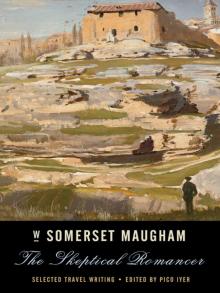 The Skeptical Romancer: Selected Travel Writing
The Skeptical Romancer: Selected Travel Writing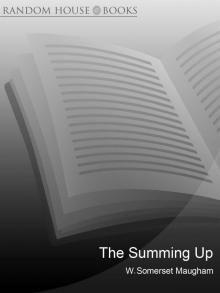 The Summing Up
The Summing Up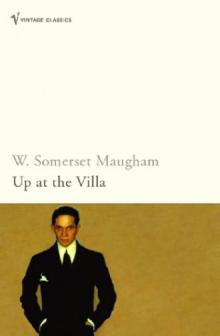 Up at the Villa
Up at the Villa The Razor's Edge
The Razor's Edge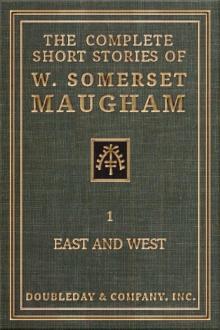 The Complete Short Stories of W. Somerset Maugham: East and West (Vol. 1 of 2))
The Complete Short Stories of W. Somerset Maugham: East and West (Vol. 1 of 2))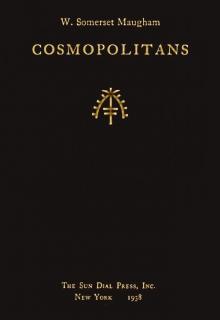 Cosmopolitans
Cosmopolitans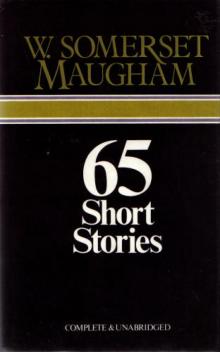 65 Short Stories
65 Short Stories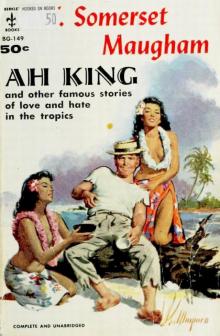 Ah King (Works of W. Somerset Maugham)
Ah King (Works of W. Somerset Maugham)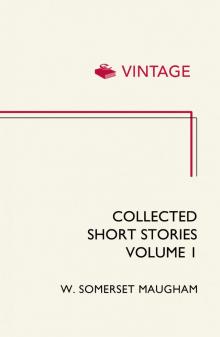 Collected Short Stories: Volume 1
Collected Short Stories: Volume 1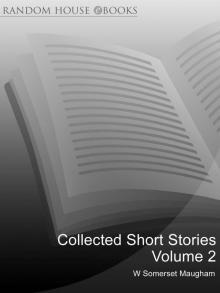 Collected Short Stories Volume 2
Collected Short Stories Volume 2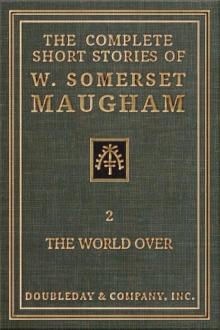 The Complete Short Stories of W. Somerset Maugham - II - The World Over
The Complete Short Stories of W. Somerset Maugham - II - The World Over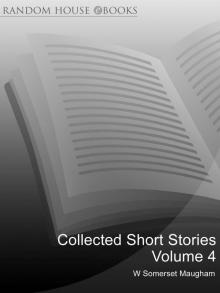 Collected Short Stories Volume 4
Collected Short Stories Volume 4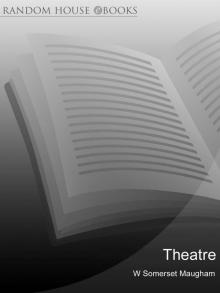 Theatre
Theatre Short Stories
Short Stories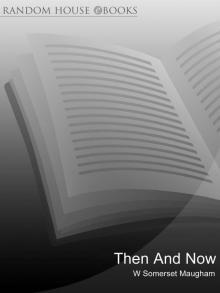 Then and Now
Then and Now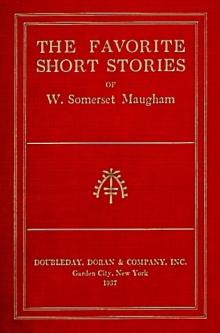 The Favorite Short Stories of W. Somerset Maugham
The Favorite Short Stories of W. Somerset Maugham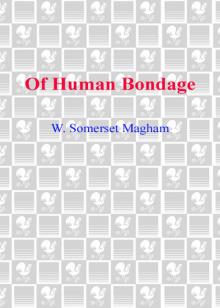 Of Human Bondage
Of Human Bondage The Magician
The Magician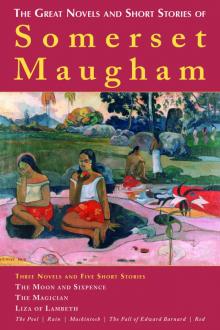 The Great Exotic Novels and Short Stories of Somerset Maugham
The Great Exotic Novels and Short Stories of Somerset Maugham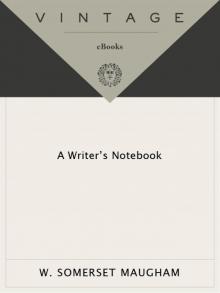 A Writer's Notebook
A Writer's Notebook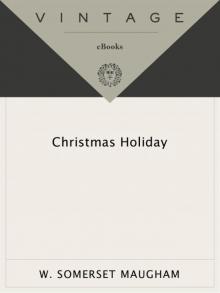 Christmas Holiday
Christmas Holiday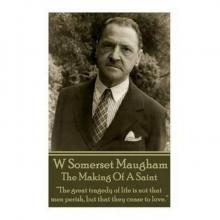 The Making of a Saint
The Making of a Saint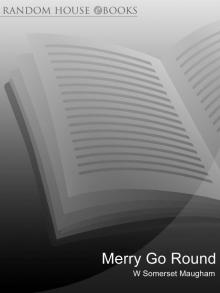 Merry Go Round
Merry Go Round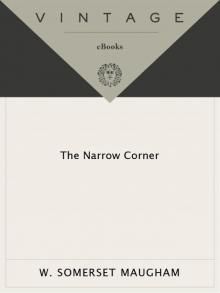 The Narrow Corner
The Narrow Corner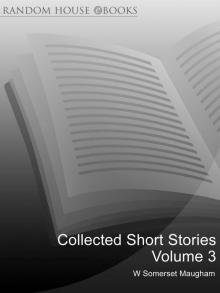 Collected Short Stories Volume 3
Collected Short Stories Volume 3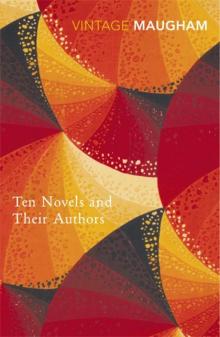 Ten Novels and Their Authors
Ten Novels and Their Authors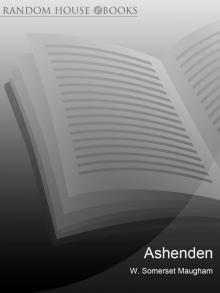 Ashenden
Ashenden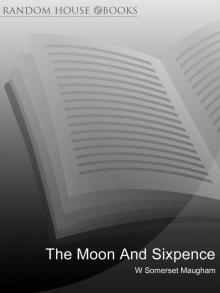 The Moon and Sixpence
The Moon and Sixpence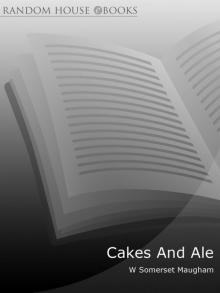 Cakes and Ale
Cakes and Ale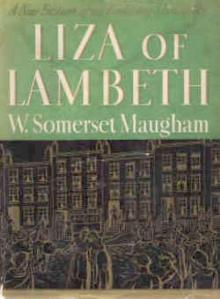 Liza of Lambeth
Liza of Lambeth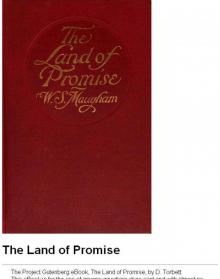 The Land of Promise: A Comedy in Four Acts (1922)
The Land of Promise: A Comedy in Four Acts (1922)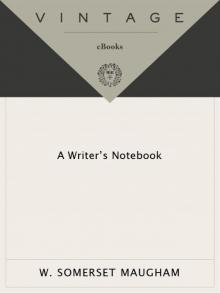 A Writer's Notebook (Vintage International)
A Writer's Notebook (Vintage International)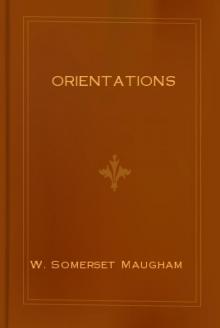 Orientations
Orientations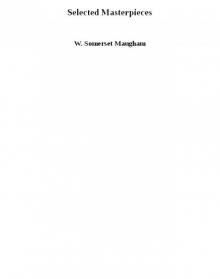 Selected Masterpieces
Selected Masterpieces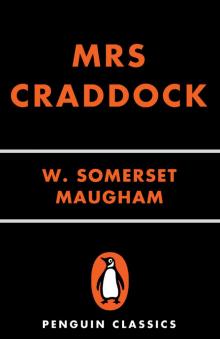 Mrs Craddock
Mrs Craddock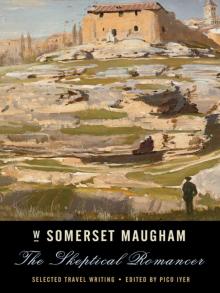 The Skeptical Romancer
The Skeptical Romancer On a Chinese Screen
On a Chinese Screen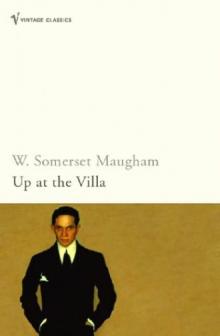 (1941) Up at the Villa
(1941) Up at the Villa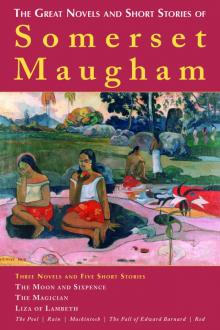 The Great Novels and Short Stories of Somerset Maugham
The Great Novels and Short Stories of Somerset Maugham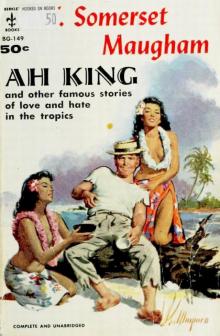 Ah King
Ah King The Explorer
The Explorer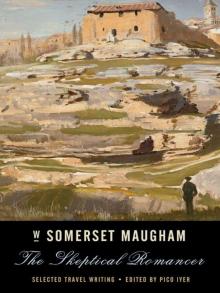 The Skeptical Romancer: Selected Travel Writing (Vintage Departures)
The Skeptical Romancer: Selected Travel Writing (Vintage Departures)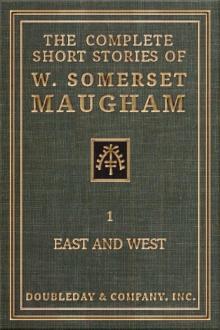 The Complete Short Stories of W. Somerset Maugham - I - East and West
The Complete Short Stories of W. Somerset Maugham - I - East and West